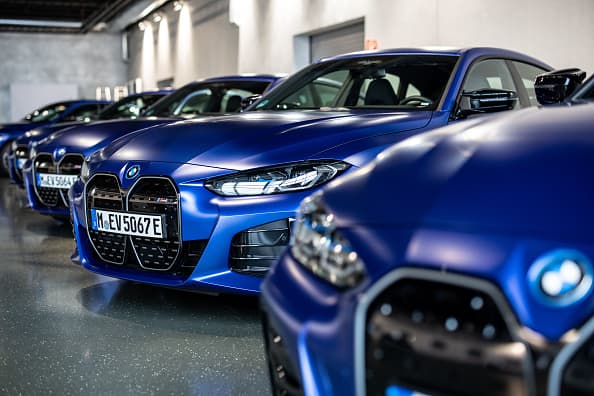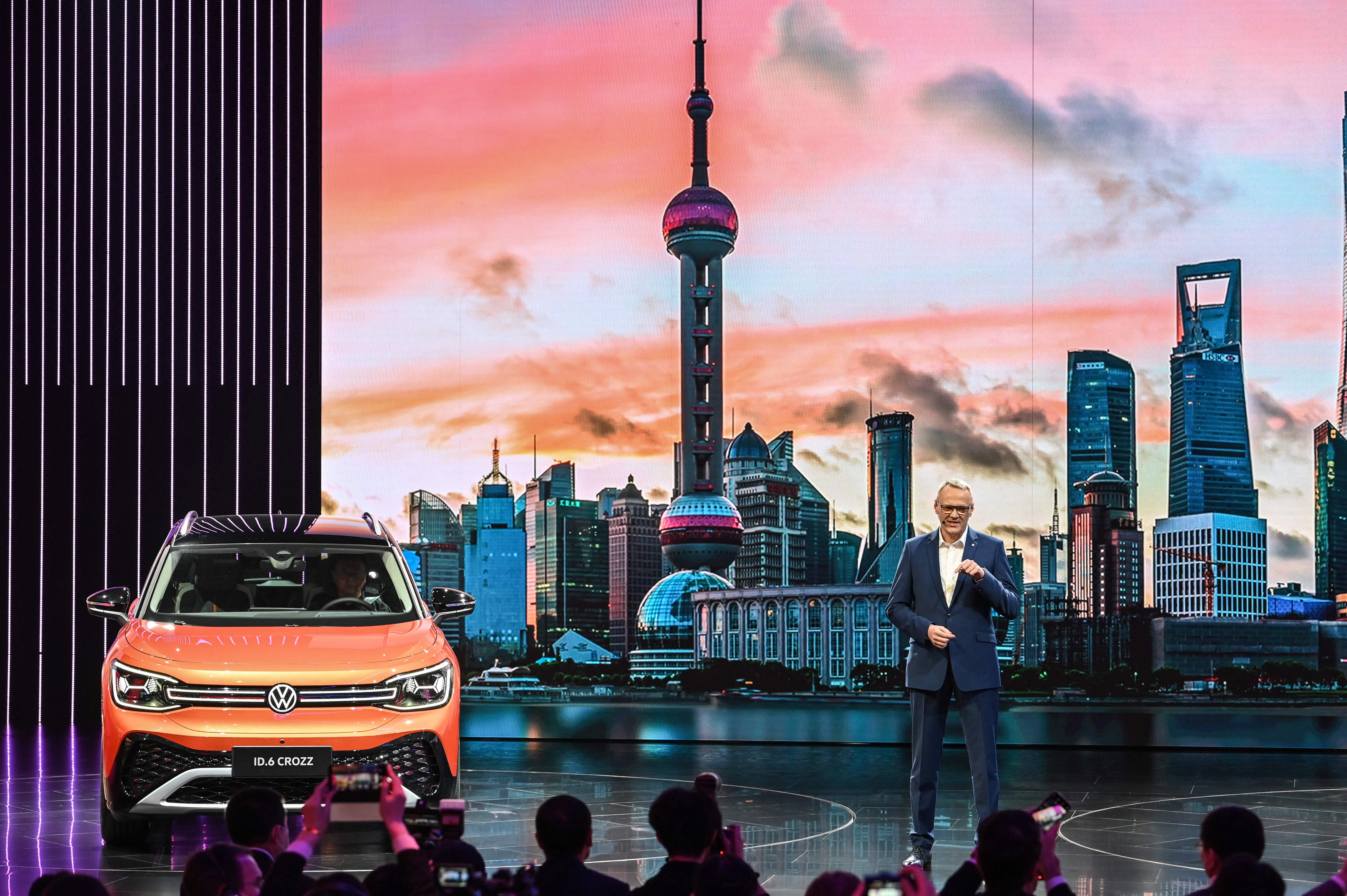November 3, 2021

The BMW i4 seen during a BMW press event in Garching, Bavaria, on September 29, 2021.
Matthias Balk | picture alliance | Getty Images
The BMW Group’s sales of fully electric vehicles grew by 121.4% in the first nine months of 2021, hitting 59,688 units, with the German carmaker stating Wednesday that electric mobility was “becoming an increasingly vital growth driver and success factor” for the company.
In total, the Munich-headquartered firm sold 231,575 all-electric and plug-in hybrid vehicles between January and September, a jump of 98.9%. By comparison, in the third quarter of 2021 alone, Elon Musk’s Tesla says it delivered 241,300 vehicles.
BMW’s electric vehicle figures were contained in an earnings report published Wednesday. Net profit for the third quarter of 2021 amounted to 2.58 billion euros ($2.99 billion), a rise of 42.4%. This was despite deliveries in its automotive segment dropping by 12.2% compared to the third quarter of 2020.
“In the third quarter 2021, operations were increasingly impacted by supply bottlenecks for semiconductor components,” the company said. “Although this resulted in production volume shortfalls and lower sales volumes during the period from July to September 2021, the impact was more than offset by positive price effects for new and pre-owned vehicles.”
Back on the EV front, the BMW Group wants fully electric vehicles to represent at least 50% of its deliveries by the year 2030.
BMW is one of several well known companies pushing an electrification strategy. In March, Volvo Cars said it planned to become a “fully electric car company” by the year 2030.
In July, the Volkswagen Group said half of its sales were expected to be battery-electric vehicles by 2030. By the year 2040, the company said almost 100% of its new vehicles in major markets should be zero-emission.
This shift to electric mobility comes at a time when major economies around the world are attempting to reduce the environmental footprint of transportation.
The U.K., for example, wants to stop the sale of new diesel and gasoline cars and vans by 2030. It will require, from 2035, all new cars and vans to have zero tailpipe emissions.
Elsewhere, the European Commission, the EU’s executive arm, is targeting a 100% reduction in CO2 emissions from cars and vans by 2035.
— CNBC’s Chloe Taylor contributed to this report
Consumers in China pick their 3 favorite electric cars — and only one is Chinese
November 3, 2021
Stephan Wollenstein, CEO of Volkswagen China, presents the new ID.6 Crozz electric car during the Shanghai International Automobile Industry Exhibition on April 19, 2021.
Hector Retamal | AFP | Getty Images
BEIJING — When it comes to their favorite electric car brand, Chinese consumers’ top choice is Warren Buffett-backed BYD, according to a survey by Bernstein.
Elon Musk’s Tesla ranks second, and third on the list is Germany’s Volkswagen, Bernstein said. The firm cited the latest results from a regular survey of Chinese consumers in the third quarter of the last few years. This year’s survey, released Thursday, covered about 1,600 respondents.
Most of those surveyed lived in China’s larger cities, with an average age of 32 and monthly income of about 19,000 yuan ($2,969), the research firm.
Nearly half the respondents said they will consider buying an electric vehicle for their next car purchase, the report said, noting consumer preferences for lower operating costs, a better driving experience and environmental friendliness.
Intent to buy an electric car from a Chinese start-up like Nio or Xpeng doubled this year to about 9.5% of those surveyed, up from around 5% for the last few years.
Chinese start-ups ranked first in the “upper mass & premium” segment of the electric car market, which covers cars costing at least 150,000 yuan ($23,437). The next most-favored in that segment was Tesla, followed by premium German brands like BMW and Audi, the survey found.
But across cars of all categories, premium German brands ranked first, followed by Japanese brands Toyota, Honda, and Nissan, and Chinese brands including BYD and Geely, the report said. Electric car start-ups ranked sixth in this category.
China is the world’s largest auto market and many European car companies are making the country the starting point in their push into electric vehicles.
Volkswagen generates about 41% of its sales volume in China, according to Goldman Sachs.
Porsche counts China as its largest single market and reported 11% growth in the first three quarters of the year from the same period a year ago. During that time on a global basis, the German luxury automaker said its recently introduced electric Taycan model outsold its flagship 911 sports car.
— CNBC’s Michael Bloom contributed to this report.
November 3, 2021

Stephan Wollenstein, CEO of Volkswagen China, presents the new ID.6 Crozz electric car during the Shanghai International Automobile Industry Exhibition on April 19, 2021.
Hector Retamal | AFP | Getty Images
BEIJING — When it comes to their favorite electric car brand, Chinese consumers’ top choice is Warren Buffett-backed BYD, according to a survey by Bernstein.
Elon Musk’s Tesla ranks second, and third on the list is Germany’s Volkswagen, Bernstein said. The firm cited the latest results from a regular survey of Chinese consumers in the third quarter of the last few years. This year’s survey, released Thursday, covered about 1,600 respondents.
Most of those surveyed lived in China’s larger cities, with an average age of 32 and monthly income of about 19,000 yuan ($2,969), the research firm.
Nearly half the respondents said they will consider buying an electric vehicle for their next car purchase, the report said, noting consumer preferences for lower operating costs, a better driving experience and environmental friendliness.
Intent to buy an electric car from a Chinese start-up like Nio or Xpeng doubled this year to about 9.5% of those surveyed, up from around 5% for the last few years.
Chinese start-ups ranked first in the “upper mass & premium” segment of the electric car market, which covers cars costing at least 150,000 yuan ($23,437). The next most-favored in that segment was Tesla, followed by premium German brands like BMW and Audi, the survey found.
But across cars of all categories, premium German brands ranked first, followed by Japanese brands Toyota, Honda, and Nissan, and Chinese brands including BYD and Geely, the report said. Electric car start-ups ranked sixth in this category.
China is the world’s largest auto market and many European car companies are making the country the starting point in their push into electric vehicles.
Volkswagen generates about 41% of its sales volume in China, according to Goldman Sachs.
Porsche counts China as its largest single market and reported 11% growth in the first three quarters of the year from the same period a year ago. During that time on a global basis, the German luxury automaker said its recently introduced electric Taycan model outsold its flagship 911 sports car.
— CNBC’s Michael Bloom contributed to this report.
No comments:
Post a Comment